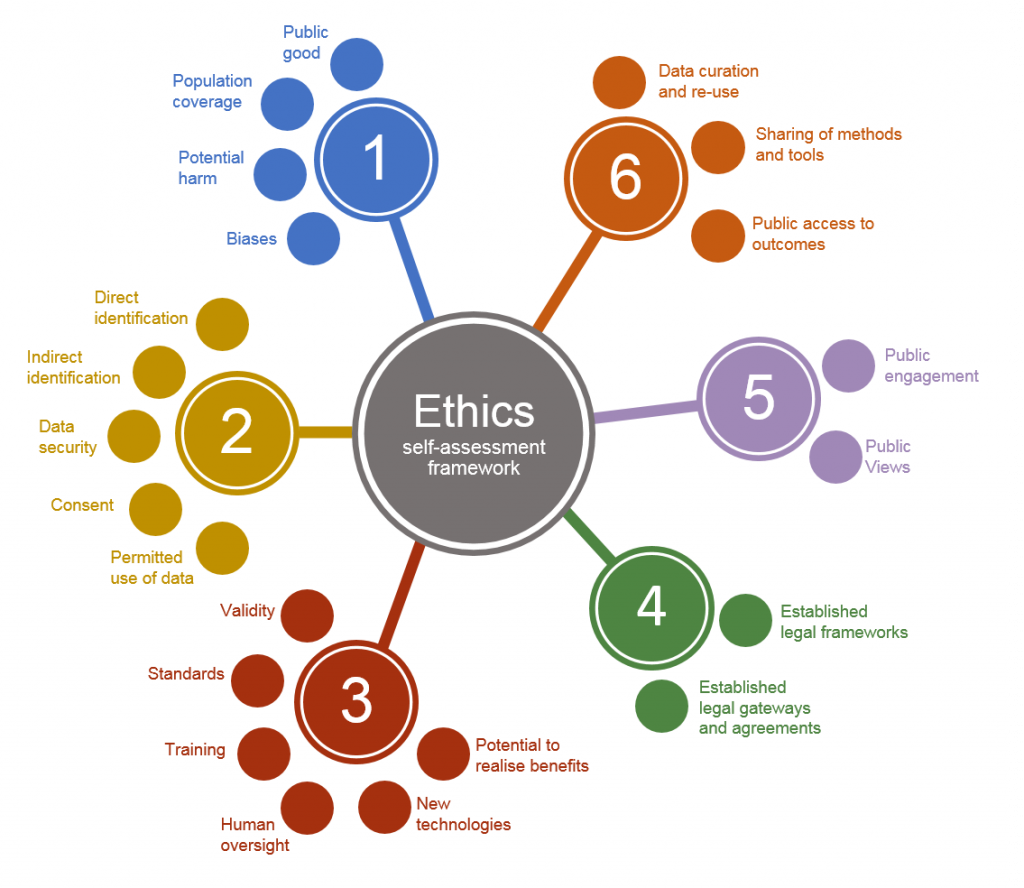A Comprehensive Guide to Privacy, Bias, Social Impact and Responsible Decision-Making

In the age of big data and artificial intelligence, data science has emerged as a transformative force, reshaping industries, driving innovation, and unlocking new frontiers of knowledge. From personalized healthcare to intelligent transportation systems, data science applications are ubiquitous, touching every aspect of our lives. Yet, with great power comes great responsibility. The ethical considerations in data science are not mere academic concerns; they are vital, real-world issues that demand immediate attention.
The Importance of Ethics in Data Science
Ethics in data science is not just about adhering to rules and regulations; it’s about aligning the immense capabilities of data-driven technologies with the values, norms, and principles that govern our society. It’s about ensuring that the algorithms and models we develop are not only efficient and accurate but also fair, transparent, and respectful of human dignity.
Main Ethical Considerations
Privacy Protection: In a world where data is the new oil, safeguarding individual privacy is paramount. How do we harness the power of data without infringing on personal rights and freedoms?
Bias and Fairness: Bias in algorithms can perpetuate and even exacerbate social inequalities. How do we build models that are free from prejudice and discrimination?
Social Impact: Data science has the potential to influence societal structures and individual lives profoundly. How do we ensure that this influence is positive and aligned with societal goals?
Responsible Decision-Making: Navigating the ethical landscape requires thoughtful and informed decision-making. How do we make choices that reflect ethical principles and societal values?
The Urgency to Address Ethical Issues
The field of data science is evolving at a breakneck pace. New algorithms, techniques, and applications are being developed every day. In this rapidly changing landscape, ethical considerations can easily be overlooked or sidelined. However, the consequences of neglecting ethics can be severe, leading to mistrust, legal challenges, and societal backlash.
The time to address these ethical considerations is now. As data scientists, policymakers, industry leaders, and citizens, we must engage in a collective effort to navigate the moral frontiers of data science. We must build a future where data science thrives not just as a technological marvel but as a responsible and ethical discipline that serves the greater good.

Privacy Protection
Definition and Importance
Privacy in data science refers to the right of individuals to control their personal information and how it’s used, shared, and stored. In an era where data is constantly collected, analyzed, and monetized, privacy becomes a cornerstone of ethical data handling. It’s not just about protecting sensitive information; it’s about preserving human autonomy, dignity, and trust in data-driven systems.
Challenges
Protecting privacy in data science is fraught with challenges:
Data Security: Ensuring that data is stored and transmitted securely to prevent unauthorized access or breaches.
Compliance with Regulations: Navigating complex legal landscapes, such as GDPR, HIPAA, and other privacy laws, requires careful consideration and adherence.
Informed Consent: Obtaining clear and informed consent from individuals whose data is being collected and processed.
Balancing Utility and Privacy: Striking the right balance between extracting valuable insights from data and maintaining privacy can be a delicate task.
Solutions
To address these challenges, several strategies and techniques can be employed:
Data Anonymization: Removing or altering personal identifiers to prevent identification of individuals.
Robust Security Measures: Implementing strong encryption, access controls, and regular security audits to safeguard data.
Transparency and Control: Providing individuals with clear information about how their data is used and giving them control over their information.
Privacy-by-Design: Integrating privacy considerations into the design and development process of data-driven projects, ensuring that privacy is not an afterthought.
Privacy protection is not a one-size-fits-all endeavor; it requires a nuanced and tailored approach that considers the specific context, risks, and stakeholders involved. A privacy-conscious approach in data science is not just a legal obligation; it’s a moral imperative. By respecting privacy, we build trust, enhance user experience, and ensure that data science serves not just the interests of businesses or researchers but the fundamental rights and values of individuals.
In a world where data is a vital asset, privacy protection stands as a beacon of responsible and ethical data science. It’s a commitment to treating data not merely as a commodity but as a reflection of human identity and dignity. Embracing privacy is not a constraint; it’s an opportunity to demonstrate integrity, build trust, and create data-driven solutions that resonate with the very essence of human values.
Social Impact
Definition and Importance
Social Impact refers to the effect that data science applications have on individuals, communities, and society at large. It encompasses both the intended and unintended consequences of data-driven technologies. In a world where data science is revolutionizing industries and shaping public policies, understanding its social impact is crucial for responsible development and deployment.
Positive and Negative Impacts
Data science has the potential to create profound social impacts, both positive and negative:
Positive Impacts:
Empowering Individuals: Personalized services, healthcare, and education tailored to individual needs.
Enhancing Public Services: Improved efficiency and effectiveness in areas like transportation, public safety, and environmental management.
Driving Social Innovation: Leveraging data for social good, such as disaster response, poverty alleviation, and community development.
Negative Impacts:
Privacy Intrusions: Potential misuse of personal data, leading to loss of privacy and autonomy.
Exacerbating Inequalities: Algorithms that reinforce existing social biases and disparities.
Ethical Dilemmas: Complex ethical questions related to consent, transparency, and accountability.
Responsibility
The social impact of data science is not a passive outcome; it’s shaped by the choices and actions of data scientists, organizations, and policymakers. There’s a shared responsibility to:
Assess Potential Impacts: Conduct thorough impact assessments to understand the potential social effects of data-driven projects.
Engage with Stakeholders: Collaborate with communities, experts, and regulators to ensure diverse perspectives are considered.
Monitor and Respond: Continuously monitor the social impact and be prepared to adapt and respond to unforeseen consequences.
The social impact of data science is a multifaceted and dynamic aspect of this exciting field. It offers immense opportunities to drive positive change, innovate for social good, and enhance human well-being. However, it also presents challenges and risks that require careful consideration, ethical reflection, and responsible action.
Data science is not just a technical endeavor; it’s a social enterprise. It’s about harnessing the power of data to create a world that is not only more efficient and intelligent but also more compassionate, equitable, and just.
Let us embrace the potential of data science to be a force for good, a tool that empowers humanity, and a path that leads to a brighter and more inclusive future. Let’s make data science not just about numbers and algorithms but about people, values, and the positive impact we can make together.
Responsible Decision-Making
Definition and Importance
Responsible Decision-Making in the context of data science refers to the process of making choices that are ethically sound, transparent, and aligned with societal values and norms. It involves recognizing ethical dilemmas, evaluating options, and making decisions that respect human rights, laws, and ethical principles. In a field where technology can have far-reaching consequences, responsible decision-making is essential to maintaining trust, integrity, and social responsibility.
Frameworks
Several frameworks and principles guide ethical decision-making in data science, including:
Responsible AI Development: A set of guidelines that emphasize transparency, accountability, fairness, and safety in AI systems.
Ethical Design Principles: Principles that focus on user-centric design, inclusivity, and respect for human autonomy.
Industry Standards and Best Practices: Adherence to professional codes of conduct, industry regulations, and international standards.
These frameworks provide a structured approach to navigate complex ethical landscapes, ensuring that decisions are not made in a vacuum but are grounded in well-established ethical considerations.
Application
Applying these frameworks in data science involves:
Identifying Ethical Dilemmas: Recognizing situations where ethical considerations are at play, such as potential biases, privacy concerns, or social impacts.
Evaluating Options: Assessing different courses of action, considering both the technical aspects and the broader ethical implications.
Consulting Stakeholders: Engaging with relevant stakeholders, including users, communities, regulators, and experts, to gather diverse perspectives.
Making Informed Decisions: Utilizing the frameworks to make decisions that are transparent, justifiable, and aligned with ethical values.
Reflecting and Learning: Continuously reflecting on decisions, learning from experiences, and adapting practices to enhance ethical decision-making.
Responsible decision-making is not a peripheral aspect of data science; it’s at the core of what it means to be a responsible data scientist. It’s about making choices that go beyond mere technical efficiency and embrace a broader understanding of ethics, society, and humanity.
Structured approaches to ethical decision-making provide a roadmap to navigate the intricate and often ambiguous ethical terrains of data science. They empower data scientists to act with confidence, integrity, and empathy, ensuring that technology serves not just the interests of a few but the values and well-being of all.
In the pursuit of innovation and excellence, let us not lose sight of our ethical compass. Let us strive to make data science a field that resonates with wisdom, compassion, and responsibility. Let us make responsible decision-making the heartbeat of our practice, reflecting our commitment to a future where technology is not just smart but also wise, ethical, and humane.
The Moral Compass of Data Science: An In-Depth Analysis of Key Ethical Cases
A Global Awakening to Privacy Concerns
The revelations about data breaches, surveillance, and misuse of personal information have ignited a global conversation about privacy. Governments, organizations, and individuals are grappling with the balance between convenience and confidentiality. Regulations like GDPR are shaping a new era of privacy-conscious technology, but challenges remain in ensuring compliance and safeguarding personal data.
The Battle Against Bias and the Pursuit of Fairness
The recognition of algorithmic bias and its societal implications has led to a concerted effort to create more equitable and inclusive algorithms. Events like the International Algorithmic Auditing Conference highlight the need for holistic approaches to scrutinize AI systems. The fight against bias is not just a technical challenge; it’s a moral imperative to ensure that technology serves all members of society fairly.
Social Impact: A Double-Edged Sword
Technology’s potential to drive positive social change is immense, but so are the risks of negative impacts. The case of the Met Police’s gangs matrix illustrates how data-driven systems can have profound real-world consequences, affecting people’s lives in ways that may infringe on human rights. The responsibility of data scientists to consider broader societal implications is more critical than ever.
Responsible Decision-Making: A Guiding Principle
The introduction of frameworks like Responsible AI Development reflects a growing awareness of the ethical dilemmas in data science. These frameworks guide data scientists in making informed and ethical decisions, emphasizing the value of structured approaches to navigate complex moral questions.
The Ethical Imperative: A Call to Action
The convergence of these themes emphasizes the ethical imperative in data science. Trustworthiness, sustainability, and responsible practice are not optional; they are essential to the future of the field. The call to action is clear: Embrace ethical practices, engage in critical reflection, and shape the field responsibly.
Cambridge Analytica scandal
Background and Methods
Cambridge Analytica was involved in several high-profile political campaigns, including the 2016 U.S. Presidential election and the Brexit referendum. The company claimed to have developed psychological profiles of voters based on their Facebook data.
The data was collected through a Facebook app called “thisisyourdigitallife,” created by a researcher named Aleksandr Kogan. While the app was presented as a personality quiz for academic research, it collected data not only from the users who took the quiz but also from their Facebook friends, without explicit consent.
The Scandal
The scandal erupted in 2018 when it was revealed that Cambridge Analytica had harvested the personal data of millions of Facebook users without their consent. This data was allegedly used to target voters with personalized political advertisements, leveraging psychological insights to influence voting behavior.
Ethical Concerns and Repercussions
The Cambridge Analytica case raised serious ethical concerns about privacy, consent, transparency, and the manipulation of democratic processes. It sparked a global debate about the power of big data and the responsibilities of tech companies to protect user privacy.
The scandal led to legal inquiries, hearings, and significant public backlash. Facebook faced scrutiny and criticism for its role in allowing the data harvesting to occur, leading to changes in its data privacy policies. Cambridge Analytica ceased operations and filed for bankruptcy in May 2018.
Lasting Impact
The Cambridge Analytica scandal has had a lasting impact on the way people perceive and interact with social media platforms. It has led to increased awareness of data privacy issues and has contributed to a broader conversation about the ethical use of data in politics and business.
The case continues to be a reference point in discussions about data ethics, highlighting the potential risks and abuses associated with the collection and use of personal data. It serves as a cautionary tale, reminding us of the importance of ethical considerations in the rapidly evolving landscape of data science and technology.
The lessons learned from the Cambridge Analytica scandal continue to resonate, influencing regulations, corporate practices, and public attitudes towards data privacy and ethical conduct.
Navigating the Moral Frontiers
The events and stories of the past year paint a vivid picture of the ethical landscape in data science and technology. They remind us that the questions we face are not merely technical but deeply human. The choices we make in designing algorithms, handling data, and implementing systems have real-world consequences that touch lives, communities, and societies.
As we move forward, the challenge is to navigate these moral frontiers with wisdom, integrity, and compassion. The path may be complex, but the stakes are high, and the opportunity to shape a more just and humane future is within our grasp.
The reflection on data ethics is not a static exercise; it’s an ongoing journey that requires continuous engagement, learning, and adaptation. The events of today lay the groundwork for the ethical considerations of tomorrow, and the dialogue must continue to evolve to meet the ever-changing landscape of technology.
This reflection encapsulates the essence of the current state of data ethics, drawing from recent events and stories to provide a comprehensive understanding. It serves as both a summary and a call to action, emphasizing the importance of ethical considerations in shaping the future of data science.
Final Thoughts
The journey through the ethical landscape of data science has taken us through the critical terrains of privacy protection, bias and fairness, social impact, and responsible decision-making. These are not isolated concerns but interconnected facets of a complex and dynamic field that holds immense promise and potential challenges.
Privacy Protection: We’ve explored the importance of safeguarding individual privacy, the challenges in achieving it, and the strategies to ensure that data is handled with respect and integrity.
Bias and Fairness: We’ve delved into the intricacies of bias, the quest for fairness, and the commitment to building algorithms that are equitable, inclusive, and just.
Social Impact: We’ve examined the profound social implications of data science, both positive and negative, and the responsibility to shape technology that resonates with human values and societal goals.
Responsible Decision-Making: We’ve emphasized the value of ethical decision-making frameworks, the wisdom to navigate ethical dilemmas, and the courage to make decisions that reflect our highest ethical principles.
The ethical imperative in data science is not a mere theoretical concept; it’s a practical and moral obligation. It’s about ensuring that data science is not just about numbers, algorithms, and profits but about people, ethics, and social responsibility. It’s about building a field that is not only innovative and efficient but also trustworthy, sustainable, and humane.
As we stand at the crossroads of technological advancement and ethical reflection, the call to action is clear:
Let us, the data science community, embrace ethical practices with enthusiasm and determination. Let us shape the field with wisdom, compassion, and integrity. Let us be the stewards of a future where data science is a beacon of responsibility, a symbol of trust, and a force for good.
Together, we can make data science not just a tool for business or research but a catalyst for positive change, a reflection of our shared values, and a testament to our collective aspiration for a better, fairer, and more enlightened world.



